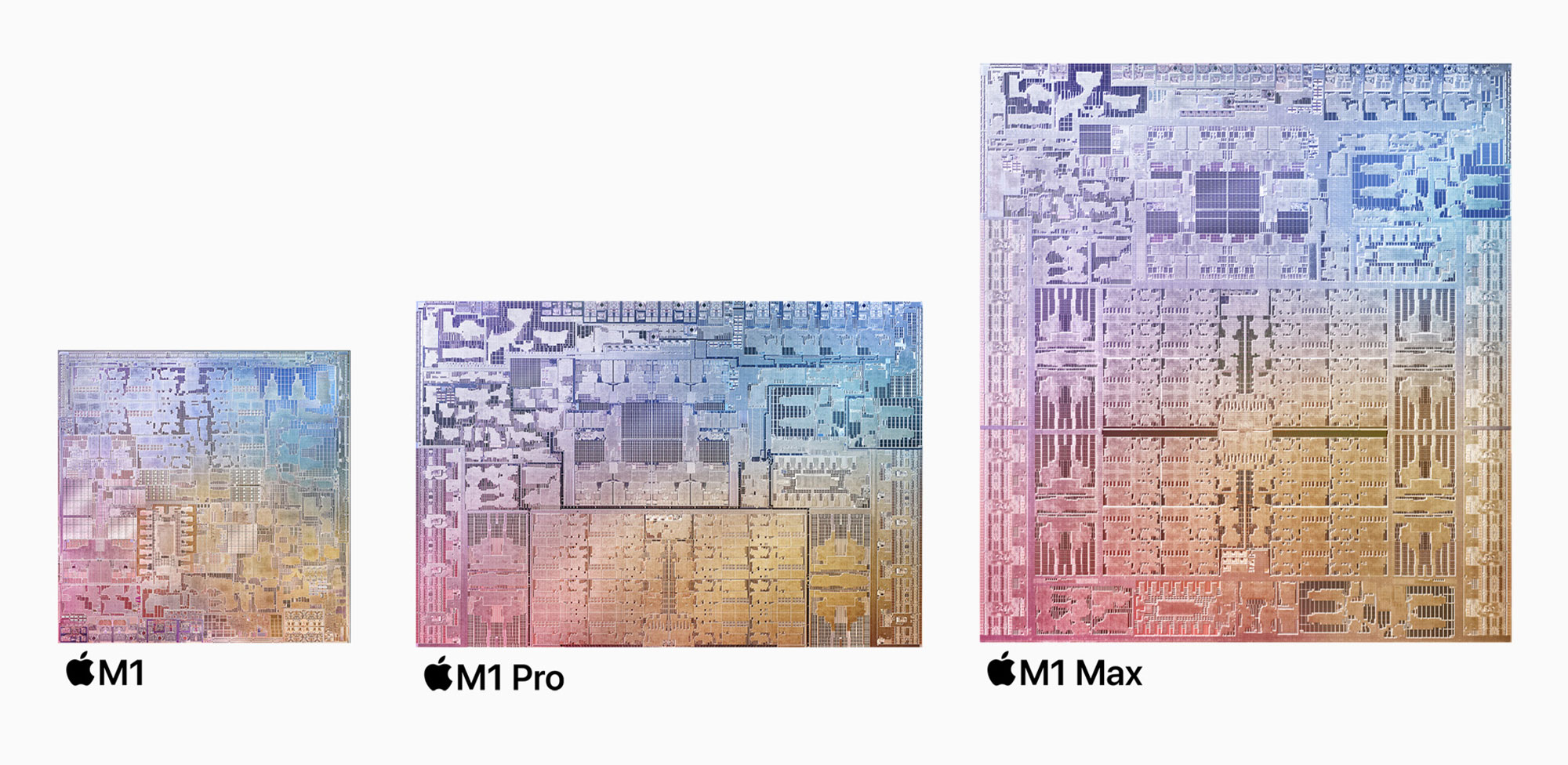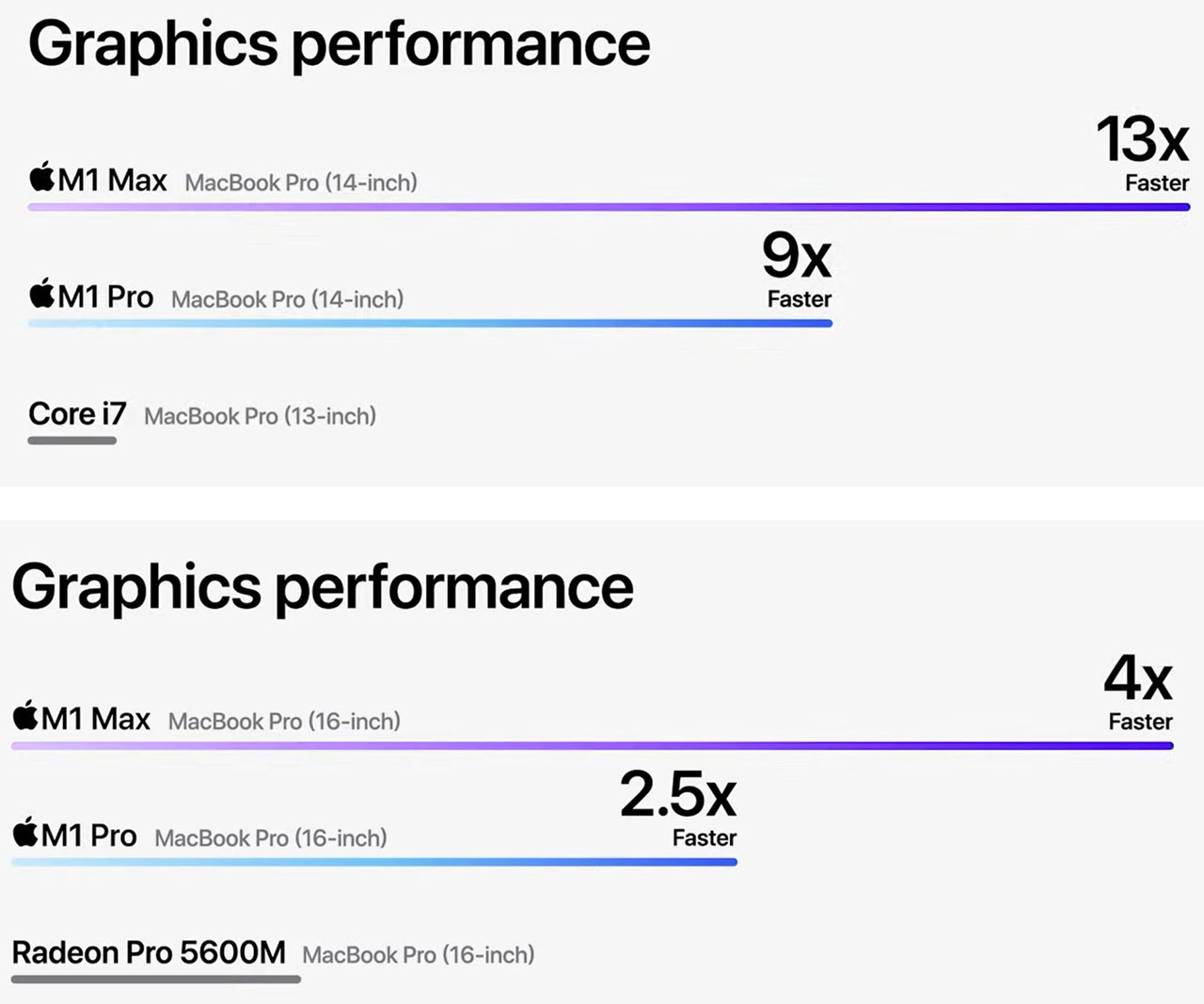At the Unleashed event in Cupertino on Monday, Apple’s highly anticipated new computer SoCs were introduced. Built on an advanced 5nm process and featuring up to 57 billion transistors, the new chips, the Apple M1 Pro and M1 Max SoCs, will initially launch as the processing options for the revamped MacBook Pro 14 and MacBook Pro 16. Key features of the new processors include a standard 8P+2E CPU configuration, GPUs with between 14- to 32-cores, from 16 to 64GB of unified RAM, and a standard 16-core Neural Engine (AI/ML) processor. Apple headlines the new SoCs as being the most powerful chips it has ever built, with up to 70 per cent faster CPU performance than the M1, and up to 4x GPU performance compared to the M1.

Apple has done a good job of summarising the charms of its new M1 Pro and M1 Max in the infographics above. Apple’s SVP of Hardware Technologies, Johny Srouji, hailed the new SoCs for delivering “massive gains in CPU and GPU performance, up to six times the memory bandwidth, a new media engine with ProRes accelerators, and other advanced technologies”. Additionally, one must not forget the “industry-leading power efficiency,” on offer which means that users of the new MacBook Pro 16 can play back 21 hours of continuous video, between charges, for example.

During its presentation, Apple sought to back up its superlative performance claims with various charts, graphics and comparisons, but it would be wise to wait for third parties to test the various M1 Pro and M1 Max laptops which will be in end-user hands starting from a week today. Nevertheless, have a peek at some of Apple’s GPU performance charts below.

The above comparisons against both Intel iGPUs and AMD Radeon RX 5600M mobile GPUs are quite eyebrow raising. Again, we need to see this performance leap evidenced in third party real-world tests. It would be good to see some gaming tests on these SoCs/devices.
In addition to the impressive CPU and GPU specs, Apple has added AI/ML accelerators and media accelerators to its SoCs. The dedicated acceleration for the ProRes professional video codec will be welcomed by many creatives in the video industry for playback and editing of multiple streams of high-quality 4K and 8K ProRes video. Apple claims the new M1 Max, in the new MacBook Pro, “can transcode ProRes video in Compressor up to a remarkable 10x faster compared with the previous-generation 16-inch MacBook Pro (Intel)”.
Apple reminds us that it is now halfway through its two-year transition from Intel and seems rather pleased with its M1, M1 Pro and M1 Max that it reckons “lead the industry in performance, custom technologies, and power efficiency.”
New MacBook Pro 14 and 16 laptops
The new MacBook Pro 14 and 16 laptops will be available with the new SoCs outlined above, starting from next week. These fifth generation MacBook Pros represent a significant change, not only in processing power, but in the following key changes:
- Apple has introduced Liquid Retina XDR displays using Mini LED technology with incredible brightness, contrast plus VRR tech.
- The displays have a notch to accommodate a 1080p FaceTime HD camera
- Apple claims that the new MacBook Pros have “the best audio system in a notebook,” with immersive audio via twin tweeters and four woofers.
- Users get up to 21 hours away from a charger and can fast charge up to 50 per cent in half an hour
- A new quiet cooling system is said to endure sustained performance under load
- Connectivity options have expanded with Apple including three Thunderbolt 4 ports, an SDXC card slot, HDMI port, an improved headphone jack that supports high-impedance headphones, and MagSafe 3 charger port
- Physical function keys have replaced the Touch Bar
 You can read more about the 2021 MacBook Pros with Apple M1 Pro and M1 Max configurations here.
You can read more about the 2021 MacBook Pros with Apple M1 Pro and M1 Max configurations here.

